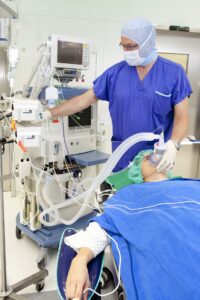BALTIMORE, MD – April, 2024 – Health care systems account for 4-5% of greenhouse gas (GHG) emissions worldwide. In the U.S., this sector accounted for about 8.5% of GHG emissions in 2018. Almost one-third comes from hospitals. Therefore, it is ironic that the health care industry is a significant source of harmful greenhouse gases.
The Centers for Medicare and Medicaid Services (CMS) is beginning a pilot program to collect GHG emissions data from the nation’s healthcare systems. The program is part of the Decarbonization and Resilience Initiative. Hospitals would voluntarily report data for its commitment to sustainability, energy use, and GHG emissions. In turn, CMS would give participating hospitals technical assistance and guidance to reduce their carbon emissions and improve sustainability. The federal agency would also publicly recognize hospital participation and performance. The initiative will last 5 years, beginning on January 1, 2026. CMS feels that decarbonization measures can improve health outcomes and quality of care for Medicare and Medicaid beneficiaries while saving tax dollars.
Climate change has been shown to be driven by human-produced GHG emissions that in turn threaten our health. More sick people will increase the total cost of health care, stress the capacity of the health care system, keep people from working, reduce the labor force, and shorten many lives.
Here are some of the metrics that hospitals can report to CMS:
- Establishment of an executive-level sustainability team
- Electricity and natural gas use
- Greenhouse gas emissions
- From motor vehicles
- From the use of inhaled anesthetic gases in the operating room
- The anesthetic agent, desflurane, is the most potent greenhouse gas.
- The storage of anesthetic gas is significant, because more nitrous oxide leaks from pipelines than from portable tanks.
Many public health experts believe that the Decarbonization and Resilience Initiative is a small step in the right direction. However, the Initiative is voluntary, limiting the number of participating hospitals, and the emissions metrics do not include most of the sources.
Listen to the full report below:
Contact: Dr. Dick Needleman, Health reporter, 103.3 AshevilleFM, [email protected]
More Posts for Show: Asheville FM News Hour
